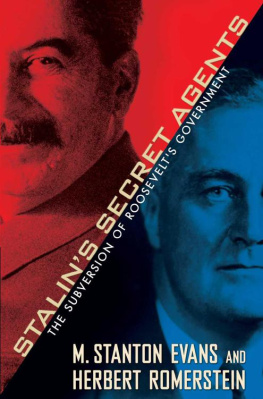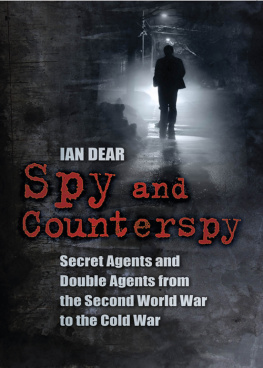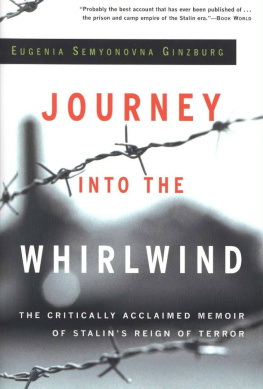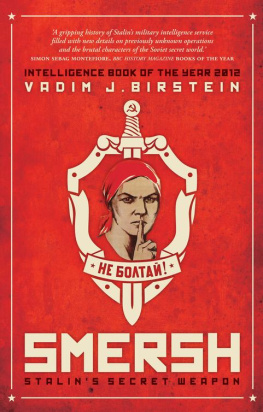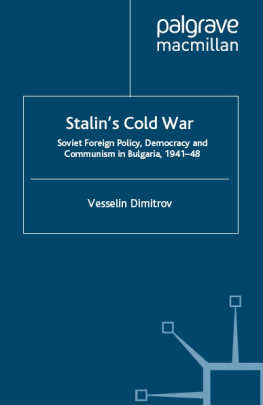
Thank you for purchasing this Threshold Editions eBook.
Join our mailing list and get updates on new releases, deals, bonus content and other great books from Threshold Editions and Simon & Schuster.
C LICK H ERE T O S IGN U P
or visit us online to sign up at
eBookNews.SimonandSchuster.com

CONTENTS
For Neal and Jane Freeman
INTRODUCTION
THE GREATEST STORY NEVER TOLD
S ince the collapse of the Soviet empire in the early 1990s, weve learned a lot about Communist tactics used against the West in the long death struggle called the Cold Warmuch of it contrary to accepted wisdom in media/academic circles.
Some of this information is brand-new, some of it confirming things already known, some completely unexpectedbut all of it important. The revelations are the more so as the story of what actually happened in the clash of global superpowers that dominated the second half of the twentieth century has yet to be told in adequate fashion. For numerous reasonssome legitimate, others notsignificant facts about this conflict were the deepest-dyed of secrets, denied outright or held back from the public, and even today arent common knowledge.
Of note in this respect, covert by nature and kept that way for decades, was the nonstop backstage warfare that was waged between the opposing forces even as peace in theory prevailed among the nations. Only by degrees have we come to understand the extent of this clandestine combat, and a great deal more is still waiting to be discovered. Even so, with the revelations of recent years we have enough data in hand to sketch the outlines of an astounding tale and fill in specifics about some matters long uncertain or contested.
Considering only its larger aspects, the Cold War story is of course well-known and doesnt need much elaboration. With the Bolshevik Revolution of 1917, conflict between the new Soviet rulers of Russia and the non-Communist nations was foreordained and, despite numerous tactical zigzags, would persist for generations. The hostility stemmed in part from conditions on the ground in Europe during World War I, but mainly from the belief of Soviet commissars Lenin and Trotsky that their victory would be the precursor to Red revolution elsewhere, and that the new Communist state would lead the way in making this happen. Soviet methods of secret warfare were developed to advance this revolutionary vision.
Generally speaking, what the new disclosures tell us about all this is that Communist covert actions against the United States and other target nations were relentless and effective, far more than most historians have imagined. The Kremlin used such tactics in systematic fashion, made them key elements of state policy, and devoted enormous resources to them. The data also show the manner in which the West fought back against this challenge, though in most cases we were on the defensive, playing catch-up, and far less practiced in secret warfare. We thus for many years experienced more defeats than triumphs, though with some victories to our credit.
As the record further shows, a main object of Moscows subliminal onslaught was to plant secret agents in the United States and other Western nations, with emphasis on official agencies that dealt with military, intelligence, or foreign policy issues. From these positions, pro-Soviet operatives were able to engage in policy sabotage, spying, and other species of subversion that advanced the interests of the Kremlin. As shall be seen, activity of this type was involved in countless aspects of the Cold War story.
Among the information sources now available on such matters, those most often cited are the Venona decrypts compiled by the U.S. Army Signal Corps in the 1940s. Venona was the code name given to encrypted messages exchanged between the Red intelligence bosses in Moscow and their agents in this country. The Army code breakers intercepted thousands of these missives and by a painstaking
Other revelations dating from the 1990s include material from the archives of the Soviet Union and other east bloc nations when for a brief period after the Communists were toppled from power such records were made available to researchers. The most recent such disclosures are the so-called Vassiliev papers, named for a former Soviet intelligence staffer who made voluminous copies of secret records and smuggled them out of Russia when he defected to the West. Similar revelations had been made by previous such defectors, including Oleg Gordievsky, Stanislav Levchenko, and Victor Kravchenko, along with native American defectors such as Whittaker Chambers and Elizabeth Bentley.
Of importance alsothough an underrated resourceare the confidential archives of the FBI, which was tracking and recording the activities of Communists and Soviet agents in the United States before Venona came on line and before the advent of the Cold War. In some recent studies the efforts of the FBI in this regard have been disparaged, but, on close inspection, these negative comments arent backed up by the record. In some cases of the New Deal years the Bureau may have missed clues it should have noted, but by the early 1940s it was far ahead of other U.S. agencies in spotting and combating the infiltration problem.
To all of which there should be addedthough this too is much neglecteda sizable trove of information about Red activity in the United States collected by committees of the Congress, based on the testimony of ex-Communist witnesses, the findings of staff investigators, and information from intelligence agencies, security squads at the State Department, and other official bodies. Like the endeavors of the FBI, the work of the committees was often downgraded or ignored while the Cold War was in progress. As may be seen today in the light of the new disclosures, the hearings and reports of the House Committee on Un-American Activities, Senate Internal Security Subcommittee, and other panels of the Congress were (and are) a gold mine of useful information on Cold War issues.
Looking at this considerable body of data, and matching one set of materials with another, we can draw certain definite conclusions about the scope of Soviet-Communist activity in the United States and other target nations. First and foremost, its evident from now-available records that Communist penetration of our governmentand our society in generalwas, over a span of decades, massive. Hundreds of Soviet agents, Communist Party members, and fellow travelers were ensconced on official payrolls, beginning in the New Deal era then increasing rapidly during World War II, when the Soviets were our allies against the Nazis.
As the record further shows, Communists and fellow travelers on official rosters in case after case were agents of the Soviet Union, plighting their troth to Moscow and striving to promote the cause of the dictator Stalin. This is of course contrary to the notion that American Reds were simply idealistic do-gooders, perhaps a bit misguided but devoted to peace and social justice, and thus shouldnt have been ousted from government jobs just because of their opinions. In countless instances, we know that domestic Communists in official posts were actively working on behalf of Russia, and thus were the minions of a hostile foreign power.
In due course many such pro-Soviet operatives rose to fairly high positions, which made their allegiance to Moscow even more problematic. The best known of these apparatchiks was Alger Hiss, who became a significant figure in the U.S. State Department in the war years and would play a critical role in planning for the postwar era. And while Hiss is the most remembered of Moscows undercover agents, he was merely one of many. As the records prove, there were dozens of others like him at the State Department, White House, Treasury, Commerce, the wartime agencies, and other official venues.
Next page
